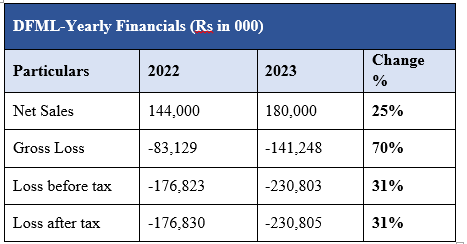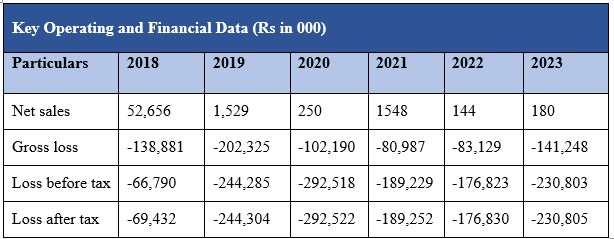INP-WealthPk
Ayesha Mudassar
Dewan Farooque Motors Limited’s (DFML) loss-after-tax (LAT) increased to Rs230 million in the financial year ended June 30, 2023 from Rs176 million in the previous year, WealthPK reports. As per the company’s annual report, DFML reported a gross loss of Rs141 million during FY23 compared to a gross loss of Rs83 million in FY22. Likewise, the loss-before-tax also surged by 31% in the period under review. The company suffered financial losses owing to unabsorbed overhead costs and other expenses. During the year, the production of the company could not be resumed mainly due to the import contraction measures, and political and economic instability.

However, a notable 25% increase in revenue was observed compared with the previous year. The automobile assembler posted a loss per share of Rs1.73 for the year ended June 30, 2023.
Six years at a glance
From 2018 to 2023, DFML witnessed a decline in net sales except in 2021. The company posted the highest net sales of Rs52 million in 2018. The loss-after-tax of the company increased until 2020 and then marginally fluctuated in the subsequent years. Furthermore, the gross loss and loss-before-tax fluctuated over these six years. DFML posted the highest gross loss in FY19.

Company profile
Dewan Farooque Motors was incorporated in Pakistan as a public limited company on December 28, 1998. The company is engaged in the assembling, progressive manufacturing and sale of vehicles in Pakistan.
Industry overview
With the development of the domestic engineering base, the automobile sector provides import substitution for local consumption. The industry employs more than 500,000 people directly and indirectly and makes a sizable contribution to the national exchequer. Throughout the first half of 2023, the automotive industry had to face import compression measures, which were introduced to address the balance of payment crisis and to promote local production. However, these restrictions on essential components created immense challenges for the manufacturing processes, which also led to disruption in the vendor supply chain, frequent plant shutdowns, and underutilisation of the company’s plant capacity.
Steep currency devaluation, rising inflation and stringent fiscal measures have driven car prices out of reach for millions. Potential buyers are experiencing unprecedented late delivery and non-availability of desired car variants due to disruption in supplies. Moreover, the increased tax burden further constrained the sector’s growth potential. The automobile sector needs an industry-friendly operating environment to overcome prevailing challenges.
Credit: INP-WealthPk













